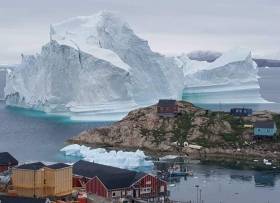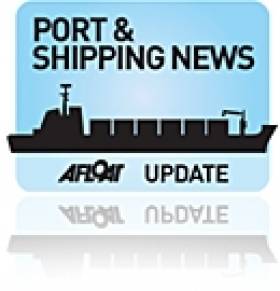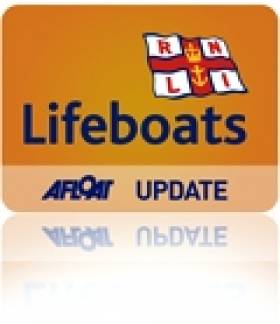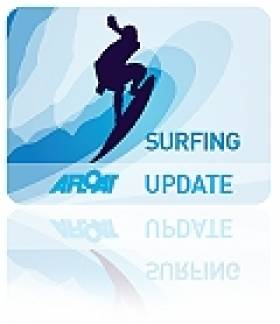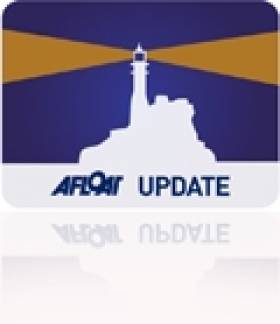Displaying items by tag: adrift
Adrift: Huge Iceberg in Greenland Threatens Village
#MarineScience - In Greenland, a huge iceberg has drifted close to a village on the western coast, prompting a partial evacuation in case it splits and the resulting wave swamps homes.
The iceberg reports BBB News is looming over houses on a promontory in the Innaarsuit village but is grounded and did not move overnight, local media say.
Local officials say they have never seen such a big iceberg before.
Last summer, four people died after waves swamped houses in northwestern Greenland after an earthquake.
Those of Inaarsuit's 169 residents living nearest the iceberg have been moved, Danish news agency Ritzau said.
"There are cracks and holes that make us fear it can calve anytime," village council member Susanne Eliassen told the local newspaper Sermitsiaq.
Click here for more on the story.
Caustic Soda Tanker Adrift 100 Miles Off Clare
#Tanker - RTÉ News reports that a tanker carrying 15,000 tonnes of caustic soda is adrift west of Loop Head after suffering engine failure.
The ship, carrying 22 crew, is said to be stranded amid rough conditions with Force 8 winds and a six-metre swell but is in no immediate danger. The Irish Coast Guard is on standby to provide assistance.
Larne RNLI Assists Yacht While On Call-Out For Drifting Boat
#RNLI - While on exercise on Sunday morning (23 June 2013), Larne RNLI’s inshore lifeboat was requested to divert and investigate reports that a boat was drifting out to sea in Larne Lough.
The 11m wooden boat had nobody onboard and represented a hazard in the area.
As the volunteer lifeboat crew neared the vessel they noticed a man in a punt approaching them. The man was from a nearby boat and having become concerned at the drifting vessel, had decided to investigate and see if he could assist.
However it was discovered that his nine 9m yacht, which had another crew member onboard, had also got into difficulty and was starting to drag its mooring.
Wind conditions were force four to five with a north gusting wind and lumpy seas.
The inshore lifeboat assisted the man back onboard his vessel and a lifeboat crew member joined him. The dragging mooring was fixed and they were able to continue under their own power.
The original drifting boat was aground, and having made sure the other vessel and its two crew were safe, the lifeboat returned to assist. Establishing a tow, Larne RNLI inshore crew were able to gently pull the boat off the rocks.
They were then met by the all-weather lifeboat and the tow was passed on to them before it was safely secured on a mooring in Larne Lough and both lifeboats returned to station.
Commenting on the call-outs, Larne RNLI lifeboat operations manager Alan Dorman said: “What started as a normal Sunday morning exercise turned into a double call-out for both lifeboats.
"It shows how quickly things can change out at sea and the lifeboat is always available to assist and reassure. Thankfully on this occasion help was close at hand and no injury or damage was done.”
South African Surfer Stranded In Shark-Ridden Seas
#Surfing - A South African surfer has survived a terrifying ordeal after being stranded alone in shark-infested waters in the Indian Ocean.
As Channel 4 News reports, 50-year-old Brett Archibald had been with friends on an overnight boat crossing from mainland Indonesia to the surfing grounds of the Mentawai Islands when he blacked out from seasickness and fell overboard in rough weather.
Unfortunately for Archibald, his friends were either asleep or suffering from seasickness themselves below deck, and several hours passed before he was noticed missing.
In the meantime, he was stranded alone in the water, surrounded by sharks and jellyfish and attacked by seagulls.
Archibald described his 28 hours adrift at sea as "insane" and said he nearly drowned eight times, but he continued to swim and tread water while, unbeknownst to him, rescue services were being mobilised for a large-scale search operation.
Channel 4 News has much more on the story HERE.
Rambler 100 Crew Member 'Feels Lucky to be Alive'
An Australian crewmember on the stricken Rambler 100, which capsized in high winds during yesterday's Rolex Fastnet Race, has told reported that he feels "lucky to be alive".
Mike Motti was one of five crew who were separated from the yacht when it overturned near Fastnet Rock off the Cork coast.
He and his fellow crewmembers spent two hours adrift on a liferaft before they were rescued in foggy conditions which made the search all the more difficult.
“I’m feeling lucky to be alive, happy to be here and it’s great to see the local people here to greet us,” Motti told The Irish Times.
Fellow crewman Michael van Beuren said the yacht capsized within 30 seconds when its keel fin snapped in heavy seas.
All 21 crew were rescued from the yacht last night in an operation led by the Baltimore RNLI lifeboat and the Irish Coast Guard.



























